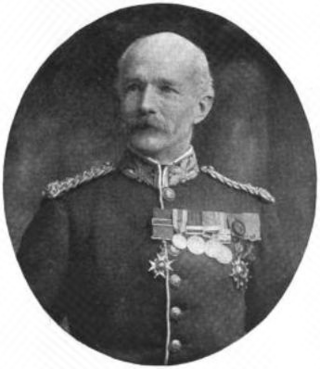Frederick Maurice (British Army officer, born 1841)
English general (1841–1912) From Wikipedia, the free encyclopedia
Major-General Sir John Frederick Maurice KCB (24 May 1841 – 12 January 1912) was a senior British Army officer, chiefly remembered for his military writings.[1]
Sir Frederick Maurice | |
|---|---|
 In The Sketch, 8 August 1900 | |
| Birth name | John Frederick Maurice |
| Born | 24 May 1841 London, England |
| Died | 12 January 1912 (aged 70) Camberley, England |
| Service | British Army |
| Years of service | 1861–1912 |
| Rank | Major general |
| Battles / wars | |
| Spouse(s) |
Annie FitzGerald (m. 1869) |
| Children | at least 11 (including Frederick Barton Maurice) |
| Relations |
|
| Other work | |
Family and early life
Maurice was born in Southwark, London in 1841, the eldest son of Rev. Frederick Denison Maurice, an Anglican priest, theologian and author,[2] by his first wife, Anna Eleanor Barton, a daughter of Lieutenant-General Charles Barton.[3][4] He published several volumes on his father's life in 1884.[2]
Maurice was educated at the Royal India Military College, Addiscombe, and the Royal Military Academy, Woolwich, and was commissioned into the Royal Artillery in December 1861.[1][5]
Career
Summarize
Perspective
Maurice served as private secretary to Sir Garnet Wolseley in the Ashanti Campaign of 1873–1874; in the Zulu War in 1879; was deputy assistant adjutant general of the Egyptian expedition in 1882; and was brevetted colonel in 1885. In 1885–1892 he was professor of military history at the Staff College, Camberley, and in 1895 was promoted to major general. Later in his career he was commander of the Woolwich District until September 1902,[6] and he retired from the army in January 1903.[7]
In 1905, Maurice was part of a team which went to Berlin to negotiate with the Germans on the problems of the Navy estimates and the escalating threat posed to the Empire. In January 1906, news was leaked to The Times that implicated him in the leaking of war material purchases, which he had discussed.[8] Sir Henry Campbell-Bannerman, the prime minister, complained to Sir Edward Grey, the Foreign Secretary, of "an outrageous interview with Genl. Sir F. Maurice in a French paper, describing all that wd. happen if Germany & France went to war; how we of course should join France".[9]
Later in the same parliament British government policy evolved around Grey's adherence to the Entente Cordiale and the British willingness to defend the neutrality of the Low Countries.[10][11]
Personal life

In Dublin in 1869, Maurice married Anne Frances "Annie" FitzGerald, the daughter of Richard Augustine FitzGerald. They had a large family of at least 11 children. His eldest son was Sir Frederick Maurice (1871–1951).[1] His second daughter Annie married John Macmillan, Bishop of Guildford. Another daughter, Cosette, married the Oxford military historian, C. T. Atkinson.
Writings
Maurice's reputation depends chiefly on his military writings, which include:
- Hostilities without Declaration of War (1883)
- Popular History of Ashanti Campaign (1874)
- A life of his father, John Frederick Denison Maurice (1884)
- The Balance of Military Power in Europe (1888)
- War (1891)
- The Great War of 1892 (1892) (along with P.H. Colomb and others)
- National Defences (1897)
- The Franco-German War, 1870–1871 (1900)
- Diary of Sir John Moore (1904)
- History of the War in South Africa, an official account (four volumes, 1906–1910)
References
External links
Wikiwand - on
Seamless Wikipedia browsing. On steroids.
